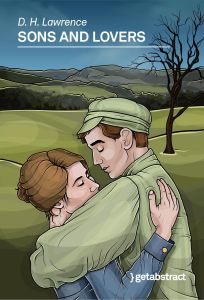
Sons and Lovers
- Novel
- Modernism
What It’s About
They Mess You Up Your Mum and Dad
D.H. Lawrence remembered that his mother would collect him and his siblings to tell them spiteful horror stories about their father. In 1926, he wrote to a friend: “We can’t help being more or less damaged.” Sons and Lovers is his mostly autobiographical account of the damage done to him by an overbearing mother and underwhelming father, but also the damage he did to the women he engaged with. Many of his contemporaries were aghast at the brutal realities and sexual liberties he described. Today some scholars snub their noses at him for being a reactionary misogynist. Yet none of that addresses his fundamental points. In this early 20th century masterpiece, the author described the effect of emotional alienation, broken dreams, borderline incestuous motherly love and repressed sexuality in a way that still resonates today – if only because we all can’t help being more or less damaged ourselves.
Summary
About the Author
David Herbert Lawrence was born on September 11, 1885, in the mining town of Eastwood in Nottinghamshire. He was the fourth child of Arthur, a virtually illiterate and alcoholic coal miner who worked in the pits from the age of 10, and Lydia, a fairly educated former teacher. He won a scholarship to Nottingham High School, but left school at 16 to find work as a factory clerk. Because of a severe bout of pneumonia he had to quit his job after three months. While convalescing he often visited a nearby farm where he befriended Jessie Chambers, who encouraged him to write. Between 1906 and 1908 Lawrence trained to be a teacher in Nottingham and started working at an elementary school in a London suburb. He published work in the English Review and entered distinguished London literary circles. In late 1910, while working on the first draft of Sons and Lovers, his mother died. He had decided to quit teaching and go abroad to make a living as a writer, when he fell in love with Frieda Weekley (née von Richthofen), the German wife of his professor at Nottingham. They eloped first to Germany and then to Italy, but Frieda was torn by the loss of her children, which put a strain on their relationship. Lawrence had learned to hate being self-sacrificial in love, yet he was keenly aware that his love sacrificed motherhood for him. They married in 1914, remaining outcasts among their previous social and family circles. During World War I the couple was accused of spying and prevented from leaving England. In 1919, they moved to Italy, and two years later to the United States via Ceylon (now Sri Lanka) and Australia. In 1924, Lawrence acquired a ranch in Taos, New Mexico, with the intention of establishing a utopian community where people could “be free.” The experiment failed, and repeated bouts of tuberculosis weakened his already frail health. In 1925, they returned to Italy and eventually to the South of France. Aside from 10 novels, his oeuvre includes numerous poems, essays and travelogues. Much of it is autobiographical in nature, focusing on the conflict between tradition and modernity and the power of sexuality. Several novels – among them The Rainbow (1915), Women in Love (1920) and most famously Lady Chatterley’s Lover (1928) – were suppressed for obscenity and even banned from publication for decades. On March 2, 1930, Lawrence died in a sanatorium near Cannes, aged 44.







Comment on this summary